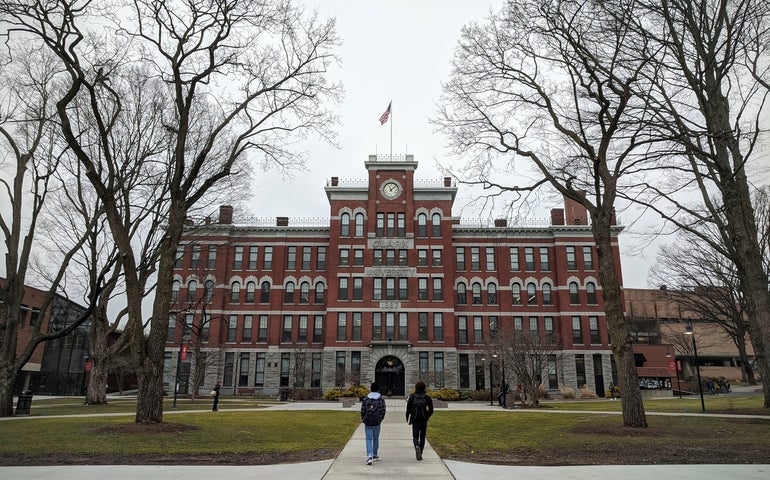Lawmakers should include an additional $125 million for public higher education in next year’s budget, advocates said Tuesday, telling stories of full-time students working multiple jobs, adjunct professors struggling to get by, and adult workers overloaded with student loan debt.
Members of Fund Our Future, an education advocacy coalition that includes unions, faith groups and progressive organizations, gathered Tuesday to detail their fiscal 2021 proposal.
The money they’re seeking represents the first installment under a bill that calls for the state to increase public higher education funding by $600 million over five years. The bill (H 1414, S 741) would also freeze tuition and fees at public campuses, as long as lawmakers keep pace with the bill’s funding targets.
The big funding request comes as Beacon Hill struggles to cram investment priorities into an annual budget anchored by large fixed costs, and as students also try to make fiscal ends meet and public officials look to see more people graduate from college and contribute to a workforce that is feeling a labor crunch.
Rep. Sean Garballey, who sponsored the bill with Sen. Jo Comerford, said the group was “coming together to demand that we revitalize the heartbeat of our commonwealth.”
The proposal for next year calls for $20 million toward ensuring “that the MassGrant Plus scholarship program covers the full unmet need for the lowest income students”; $6 million for debt relief for public college and university graduates who go to work in Massachusetts public schools; $13 million toward health insurance for adjunct faculty and staff and another $7 million toward achieving pay equity for adjuncts; $15 million to “relieve the burden of existing capital debt with the requirement that the savings be invested in hiring full-time faculty and staff and investing in other student success programs”; and $64 million to fund state college and university operating budgets “at levels sufficient to freeze tuition and fees.”
Massachusetts has the fastest growing public college costs and the second-fastest growth in student debt in the country, according to the coalition, which said state funding of public colleges and universities has fallen from $12,000 per student in 2001 to $8,000 per student.
Salem State University sophomore Meghan DeVeau said she works three jobs to pay for school, and that most other students she knows work 35 to 40 hours a week. Last year, she said, 15 people she knew either dropped out of college or took a semester off that stretched into additional time away from campus.
College has become “almost impossible to afford without struggling,” DeVeau said.
Adjunct professor DeAnna Putnam, who teaches at Bunker Hill and Middlesex community colleges, said the adjuncts who make up 70 percent of community college faculty teach without offices, health insurance or job security.
“Community colleges expect us to have advanced, expensive degrees,” Putnam said. “We have our own student debt to deal with and we cannot pay our bills. We’re barely paying our rent. We have faculty that have needed to go to food pantries, so if we really do want to support community colleges … we need increased funding to stabilize our faculty.”
Next year’s budget will be the first to contain money associated with a $1.5 billion, seven-year K-12 school finance overhaul Gov. Charlie Baker signed in November. Fund Our Future advocated for those reforms, and members who spoke at Tuesday’s event said they are now turning their focus to college spending.
“We can’t afford to send students from the best funded pre-K through 12 system over an education cliff into a deeply underfunded public college system that cannot serve the needs of this commonwealth and its people,” said Zac Bears,the executive director of the Public Higher Education Network of Massachusetts.
Baker filed his $44.6 billion spending plan last month, and after hearings in February and March — the one delving into education and local aid is set for March 6 — the House and Senate Ways and Means committees will rewrite Baker’s proposal and put their own versions before lawmakers, who will have the chance to offer amendments before a floor debate. The House conducts its budget deliberations in April and the Senate in May.
Baker’s office said his budget (H 2) includes $1.3 billion total for the Department of Higher Education, University of Massachusetts, state universities and community colleges, for a 3 percent, or $33.2 million, increase over this year. Administration officials have described the increase for the UMass system as 1 percent plus the cost of collective bargaining.
Baker said it includes $5 million for a new scholarship program to help cover tuition and fees for students who are eligible for federal Pell grants, $1.3 million for fee waivers and aid for students currently or previously in Department of Children and Families custody, and $2.3 million to expand early college and career programs.
“As students graduate from high school, our administration is committed to providing several affordable and flexible options to earn college degrees and secure good-paying jobs and careers,” he said at a Jan. 22 press conference.
State budget writers have projected a slower revenue growth rate — 2.8 percent — next year than in previous years. Lawmakers did not include a new funding source in the 2019 K-12 investment bill, but the Legislature is pushing toward the 2022 ballot a constitutional amendment that could generate $2 billion in annual taxes by levying a higher tax rate on household income above $1 million.
Bears said there is an “underfunding crisis” in public higher education and that lawmakers “should raise the money to get us out of it.”
“They seem to find money for things that they think are important,” he told the News Service. “There’s more than enough wealth in the state that we can find $120 million to fund public higher education this year.”
-END-

